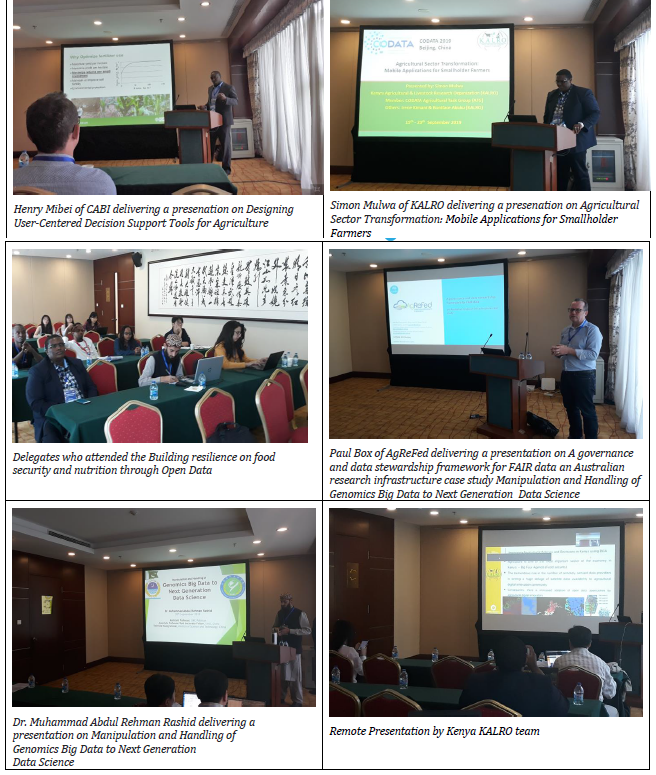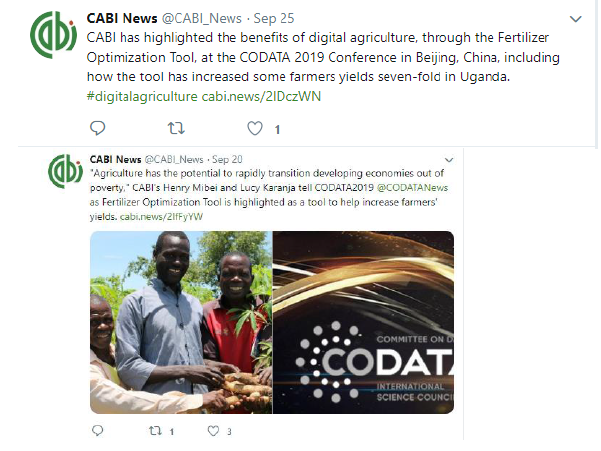Name: Henry Mibei
Designation: Operations Manager Mobile, Africa
Organization: CAB International
CODATA 2019 conference: Towards next-generation data-driven science: policies, practices and platforms
Background:
CODATA exists to promote global collaboration to improve the availability and usability of data for all areas of research. CODATA supports the principle that data produced by research and likely to be used for research should be as open as possible and as closed as necessary. CODATA works also to advance the interoperability and the usability of such data: “Research data should be intelligently open or FAIR”. By promoting the policy, technological and cultural changes that are essential to make research data more widely available and more usable, CODATA helps advance ICSU’s mission of strengthening international science for the benefit of society. The conference, themed, ‘Towards next-generation data-driven science: policies, practices and platforms’ was organized by CODATA and CODATA-China with support from the Chinese Academy of Sciences (CAS), Ministry of Science and Technology (MOST) of P. R. China, China Association for Science and Technology (CAST), and National Natural Science Foundation of China. The conference attracted more than 300 participants from six continents and representing 45 countries.
Objective of the Conference
This conference provided a significant opportunity to survey and examine developments in open data policies from a global perspective.
My Objectives
- To present a The paper was accepted for publication in the Data science journal. http://datascience.codata.org/.
- To build networks with academics and experts and to share thoughts on advances and technological breakthroughs for future business
- To increase visibility of CABI the organization I work for, and CODATA who sponsored my attendance in the conference
Science globally is being transformed by new digital technologies. At the same time addressing the major global challenges of the age requires the analysis of vast quantities of heterogeneous data from multiple sources. In response, many countries, regions and scientific domains have developed Research Infrastructures to assist with the management, stewardship and analysis. These developments have been stimulated by Open Science policies and practices, both those developed by funders and those that have emerged from communities. The FAIR principles and supporting practices seek to accelerate this process and unlock the potential of analysis at scale with machines.
Benefit to attending the Conference
Attending the conference gave me an opportunity to showcase my research findings in open science space. Networking and exposure also gave me an opportunity for future collaboration. It was an opportunity to increase the visibility of CABI and CODATA.
- Interacting with researchers and experts in this International forum was a good way of increasing CABI’s visibility in the data science space, a current and trending area for business
- CABI as the current host of the GODAN secretariat, which advocates for open data and open access policy as well as release and reusability of data for improved environmental and social outcomes needs to be more represented in similar forums to showcase our strengths in data science as we week new partnerships in the My attendance to the conference was a benefit to CABI.
- CABI’s research is diverse and large quantities of data are gathered and generated therefore maintaining a good relationship and publishing in the CODATA science journal and other affiliated journals gives CABI more options to publish data science related work in a wide array of journals improving knowledge access and
Title of Presentation(s):
Session Title: Building resilience on food security and nutrition through Open Data https://conference.codata.org/CODATA_2019/sessions/143
| Beijing – China | Kenya – Nairobi |
| Room No. 10, Friendship Palace Date: Sept. 20, 2019
Time: 11:30 am – 13:00 pm Time: 14:00 pm – 15:30 pm |
Room: KALRO Hqts Board Room Date: Sept. 20, 2019
Time: 6:30 am- 8:00 am Time: 9:00 am – 10:30 am |
Programme
| Session Introduction
143: Building resilience on food security and nutrition through Open Data |
Facilitator: Henry Mibei |
Onsite Presentations
| 1 | 407: A governance and data stewardship framework for FAIR agricultural data: The | Paul James Box Paul.j.box@csiro.au | Paul James Box , Kerry Levett , Bruce Simons , Megan Wong |
| Agricultural Research Federation
(AgReFed) – an Australian research infrastructure case study |
|||
| 2 | 476: User-centered design in development of Decision support tools: Lessons from the development and deployment of a Fertilizer Optimization tool for fertilizer use by smallholder farmers in Africa | Henry Mibei h.mibei@cabi.org | Henry Mibei, Harrison Rware |
| 3 | 479: Agricultural Sector Transformation: Mobile Applications for Smallholder Farmers# | Simon Mutuku Mulwa simon.mulwa@kalro.or g | Irene Wambui Kimani, Simon Mutuku Mulwa, Boniface Akuku |
| 4 | 514: Manipulation and Handling of genomics big data to next generation data Science | Muhammad
Abdul Rehman Rashid rashidpdg@hotmail.co m |
Muhammad
Abdul Rehman Rashid |
| Remote Presentation Audio- Kenya KALRO HQTs Boardroom | |||
| 1 | 458: Improving Agricultural Policies and Decisions in Kenya using Data Cube Architecture | Boniface Okelo Akuku boniface.akuku@kalro. org | Boniface Okelo Akuku, Boniface Okelo Akuku, Kenneth Mubea, Brian Killough |
| 2 | 527: Communicating Data: Evidence from Lessons and Experiences of Agricultural Science and
Technology Indicators |
Virginia Wangari Ndungu | Virginia Wangari Ndungu, Irene Wambui Kimani |
| 3 | 484: Small Holder Farmers Reap Big: Kenya Agricultural Observatory Platform | Irene Wambui Kimani irenewarui@yahoo.com | Irene Wambui Kimani, Boniface A Akuku, Joseph Wafula |
| 4 | 515: Mitigating the effects of climate change through early warning and monitoring systems: A case of the small holder farmer in Kenya | Morris Gatheru morris.gatheru@kalro.o rg | Morris Gatheru, Boniface Akuku, Irene Kimani |
| Closing remarks- Way Forward, All | |||
This session was primarily chaired by Henry Mibei where eight papers were presented, four papers onsite and four presented remotely. Henry noted that resilience building will require the use of timely and accurate data/information that leverages on technologies that build on agro-ecological knowledge and the entire agricultural value chain layers comprising farmers, environment information and agricultural practices. Henry presented a paper on designing user-centered decision support tools for agriculture outlining the lessons from the development and deployment of a fertilizer optimization tool. HM outlined that any digital product should be developed considering user’s requirements, objectives and feedback. “If we don’t solve real problems for our users, they’re not going to give us business. Design has to do with intention and that intention is always to solve a human problem. Successful systems and products begin with an understanding of the needs and requirements of the users”.
Highlights:
- Information ranging from climate and rainfall patterns, droughts, trends in crop pests and diseases to the number of farmers in a particular area should be put in the public domain so that it can be easily accessed to facilitate decision-making
- There is often too much information available to make a clear decision, with so much data to sort through, you need something more from the There is a need then to think about the capacity to analyse data and to apply that information to decision-making.
- Open data is crucial in modernizing food production systems and governments in particular should strive to make it accessible especially to the smallholder
- Question on sustainability of donor projects emerged e. being able to perform and deliver project benefits to the primary target group after the funding from a donor terminates. What should be done? Sustainability requires long term planning to facilitate diverse donor engagement and to improve institutional capacity of the target population. It is important to integrate sustainability aspects in the project right from the beginning. This will help to develop partnerships and relations with relevant stakeholders at an early stage of project development and ensure that once the primary funding terminates there is a strong support to continue delivering project’s objectives. It is also important to involve key stakeholders in program development. As part of the project activities initiate multi-stakeholder dialogue workshops should be conducted to involve relevant people in the project.

Benefits/Value add to CODATA
- The visibility of CODATA was quite excellent
- This was an opportunity for CODATA to increase its visibility to more than 300 delegates and the rest of the world that never came through the
- CODATA was acknowledged in my presentation slides and the presentation was also linked to a story published in CABI’s website accessed in the link https://www.cabi.org/news-article/fertilizer-optimization-tool-to-increase-farmers- yields-highlighted-at-codata-2019-conference/
- CABI has a global presence, with 500 CABI staff in different continents.
- Refer to Henry Mibei’s presentation, co-written with Rware, ‘Desig ning User –Centered Decision Support T ools f or Agriculture’ which is downloadable from the SCRIBD platform.
- CODATA acknowledged in the publications that will be sent to the patterns and the CODATA Science
- Publicity through social media is as below;

Delegates at CODATA 2019 Conference, Friendship Hotel Beijing China, 19th September 2019
Contacts/Collaborations
Conveners: CODATA, CODATA China
Supporter: Minister of Science and Technology (MOST), Chinese Academy of Sciences (CAS), NSFC
Local organizer: Computer Network Information Center, CAS; National S&T Infrastructure Center, MOST
